 Global| Mar 01 2002
Global| Mar 01 2002Personal Income & Spending Strong
by:Tom Moeller
|in:Economy in Brief
Summary
Personal income rose a surprising 0.4% last month, due to a 2.2% surge in transfer payments. Wage & salary disbursements fell slightly following a 0.5% gain in December. Nevertheless, it was the fifth month in six of little or [...]
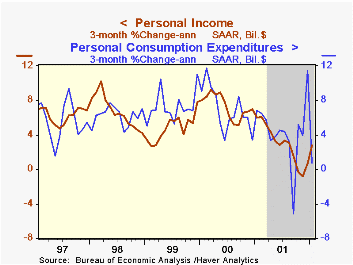
Personal income rose a surprising 0.4% last month, due to a 2.2% surge in transfer payments.
Wage & salary disbursements fell slightly following a 0.5% gain in December. Nevertheless, it was the fifth month in six of little or negative growth in wages.
Personal spending was strong, as expected, for the first month in three. Though spending on durable goods fell sharply for the third straight month, reflecting lower sales of light vehicle, sales of nondurables and services were strong.
Disposable income rose a strong 1.6%, the first material gain in five months and reflected a sharp drop in taxes.
The PCE price deflator rose slightly (0.6% y/y) for only the second month in seven. Core prices rose 0.1% (1.2% y/y) following a slight December decline.
| Disposition of Personal Income | Jan '02 | Dec '01 | Y/Y | 2001 | 2000 | 1999 |
|---|---|---|---|---|---|---|
| Personal Income | 0.4% | 0.3% | 2.5% | 4.9% | 7.0% | 4.7% |
| Personal Consumption | 0.4% | 0.0% | 3.4% | 5.0% | 7.7% | 6.7% |
| Savings Rate | 1.8% | 0.6% | 0.9% | 1.6% | 1.0% | 2.4% |
| PCE Price Deflator | 0.1% | -0.2% | 0.6% | 1.9% | 2.7% | 1.6% |
by Tom Moeller March 1, 2002
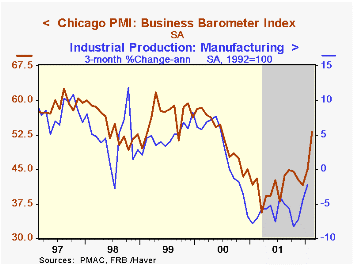
The Chicago Purchasing Manager’s Index of Business activity rose more than expected in February versus January, and was at its highest level since June 2000.
Indexes of new orders, production, inventories and employment all rose.
The prices paid index rose sharply and the index of vendor delivery speed rose, indicating an abatement of recent deflationary pressure.
| Chicago Purchasing Managers Index, SA | Feb | Jan | Y/Y | 2001 | 2000 | 1999 |
|---|---|---|---|---|---|---|
| Business Barometer | 53.1 | 45.1 | 43.0 | 41.4 | 51.8 | 56.5 |
| Prices Paid | 51.2 | 40.7 | 63.5 | 50.5 | 65.6 | 57.6 |
by Tom Moeller March 1, 2002
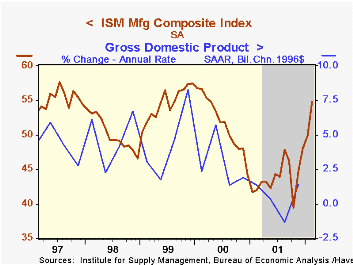
The ISM Composite Index of manufacturing sector activity rose much more than expected last month. Consensus expectations were for a gain to 50.5.The strength was in line with yesterday's Chicago Purchasing agents' report.
Each of the index's components except inventories contributed to the rise in the composite, but the rise in orders was sharpest rising to the highest level since November 1994.
Inflation pressure fell slightly, contrary to the indication of firmer pricing in the Chicago report.
| ISM Manufacturing Survey | Feb | Jan | Y/Y | 2001 | 2000 | 1999 |
|---|---|---|---|---|---|---|
| Composite Index | 54.7 | 49.9 | 42.0 | 43.9 | 51.6 | 54.6 |
| Prices Paid Index | 41.5 | 43.9 | 55.6 | 43.0 | 64.8 | 54.2 |
by Tom Moeller March 1, 2002
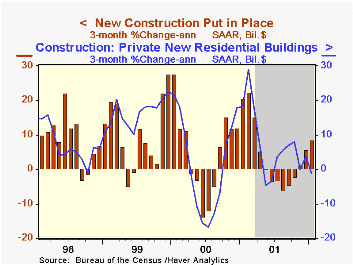
The value of construction put in place rose much more than expected in January, driven by sharply higher nonresidential and public construction.
The surprise in nonresidential building was a pop after nine months of extreme weakness during which nonresidential building fell 16.9%. Decline during that period was led by a 33.6% drop in industrial building and a 25.2% decline in office construction.
In the residential sector, single-family residential building rose a slight 0.4% following four months of zero or negative change.
Spending by governments again was strong, led by education, highways & streets and hospitals.
| Construction Put-in-place | Jan '02 | Dec '01 | Y/Y | 2001 | 2000 | 1999 |
|---|---|---|---|---|---|---|
| Total | 1.5% | 0.5% | 2.0% | 5.6% | 7.0% | 8.6% |
| Residential | 0.1% | 0.5% | 4.2% | 5.6% | 7.4% | 11.1% |
| Nonresidential | 2.2% | -2.9% | -14.3% | -0.4% | 8.0% | 1.9% |
| Public | 3.7% | 2.9% | 17.5% | 11.1% | 4.5% | 10.1% |
by Tom Moeller March 1, 2002
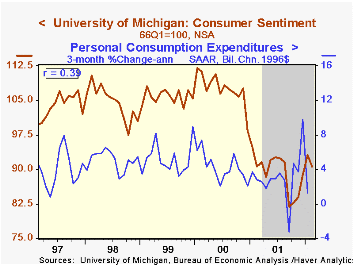
The Univ. of Michigan's Index of Consumer Sentiment was a bit weaker than expected for the full month of February, falling 2.5% m/m.
The decline in sentiment reflected a lower reading of consumer expectations but a higher reading of the current situation.
The decline in sentiment paralleled the 3.8% m/m decline in the Conference Board's February measure of Consumer Confidence.
The University of Michigan survey is not seasonally adjusted.
During the past five years there has been a 39% correlation between the level of consumer sentiment and the 3-month % change in real PCE.
| Univ. of Michigan | Feb '02 | Jan '02 | Y/Y | 2001 | 2000 | 1999 |
|---|---|---|---|---|---|---|
| Consumer Sentiment | 90.7 | 93.0 | 0.1% | 89.2 | 107.6 | 105.8 |
by Tom Moeller March 1, 2002
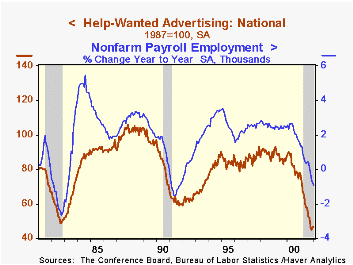
The Conference Board's National Index of Help-Wanted Advertising was stable in January at a low level.
During the past ten years there has been a 74% correlation between the level of help-wanted advertising and the three-month % change in nonfarm payrolls.
By region, job opportunities appeared strongest in the Mountain and East South Central regions of the country.
The figures are seasonally adjusted.
| Conference Board | Jan '02 | Dec '01 | Jan '01 |
|---|---|---|---|
| Nat'l Help Wanted Index | 47 | 47 | 77 |
Tom Moeller
AuthorMore in Author Profile »Prior to joining Haver Analytics in 2000, Mr. Moeller worked as the Economist at Chancellor Capital Management from 1985 to 1999. There, he developed comprehensive economic forecasts and interpreted economic data for equity and fixed income portfolio managers. Also at Chancellor, Mr. Moeller worked as an equity analyst and was responsible for researching and rating companies in the economically sensitive automobile and housing industries for investment in Chancellor’s equity portfolio. Prior to joining Chancellor, Mr. Moeller was an Economist at Citibank from 1979 to 1984. He also analyzed pricing behavior in the metals industry for the Council on Wage and Price Stability in Washington, D.C. In 1999, Mr. Moeller received the award for most accurate forecast from the Forecasters' Club of New York. From 1990 to 1992 he was President of the New York Association for Business Economists. Mr. Moeller earned an M.B.A. in Finance from Fordham University, where he graduated in 1987. He holds a Bachelor of Arts in Economics from George Washington University.
More Economy in Brief
 Global| Feb 05 2026
Global| Feb 05 2026Charts of the Week: Balanced Policy, Resilient Data and AI Narratives
by:Andrew Cates






